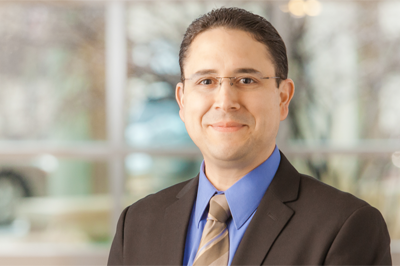Why do I need a family doctor?

Scott Lyons knows the importance of having a family doctor for himself and his children. “I’ve been seeing a doctor annually for my entire life,” he says. “I’ve learned that being on the front side is a lot better than being on the back side.”
Lyons, who watched his father battle a host of health problems including diabetes, heart problems, asthma and prostate cancer, is committed to staying on top of his health to avoid being in the same predicament as his father.
Find a doctor in your neighborhood. Call us at 800.922.0000.
"My family doctor knows me and my family history so he knows what to watch for and can make sure I get the correct preventive tests at the right time,” he says. “And the same goes for my kids. We all have a great relationship with him.”

Douglas Inciarte, MD, Nebraska Medicine family practitioner, who has been the Lyons’ family doctor for the last few years, doesn’t take that relationship for granted. “It’s so important to have trust with your patients,” he says. “When you have trust, patients are more open and likely to share and follow my recommendations, which will result in better health outcomes.”
Dr. Inciarte says you should think of your family doctor as the coordinator of your care. He or she makes sure all of your general health care maintenance is handled – like annual exams, lab tests and preventive screenings. These are things that can easily fall by the wayside if no one is keeping track of them. The earlier potential health issues are caught, the more likely action can be taken to prevent them from becoming more serious or life-threatening.
You should also get to know your doctor before you really need him, notes Dr. Inciarte. A good family doctor can take care of 85 percent to 95 percent of your health care needs. In fact, studies suggest that access to primary care through family physicians is associated with improved health outcomes, lower mortality rates, reduced emergency department use, decreased rates of preventable hospital admissions, less invasive and lower cost care and higher patient satisfaction.
Watch this Facebook Live event and learn more about why you should have a family doctor.
Lyons can attest to this from personal experience. He and his daughter both have asthma, which often leads to sinus infections and other issues. “Dr. Inciarte is always on top of their medications before it becomes a bigger problem,” notes Lyons. Annual visits with one of his sons also led to the discovery of a hearing problem as well as an issue with his enzymes. “Dr. Inciarte was on top of both issues and he is doing well as a result,” says Lyons. “Another one of my sons has attention deficit disorder (ADD). His relationship with Dr. Inciarte is so good that he sometimes shares things with Dr. Inciarte that he won’t even share with my wife and me.”
Annual physicals are important in both children and adults, notes Dr. Inciarte. Annual physicals for children focus not only on your child’s physical health, but also on the developmental, emotional and social aspects of your child’s health. “We’ll monitor your child’s eyesight and hearing – things that can affect their learning and development if there is a deficiency,” he says. “We’ll also watch for things issues like depression, attention deficit disorder, allergies, asthma, exercise, sleep, and nutrition and immunizations. As your children reach the teenage years, we’ll educate them about safety, healthy lifestyle habits, drugs, alcohol, STDs, depression and continue health screenings based on your family history.
“I really enjoy working with the whole family because I become familiar with their family history and the dynamics of the family, which can both help me be a more effective doctor. We get to know each other on a very personal level and that’s rewarding.”




